Gillian Welch: Dark Turn Of Mind
Published on June 27th, 2012 in: Culture Shock, Feminism, Music |By Paul Casey
Out of hospital a few days. Nighttime seizures cause strange dreams. Out of place. A rare, complete family notion: Let’s rent a movie. A dividing line between a childish reality and a childish regression.
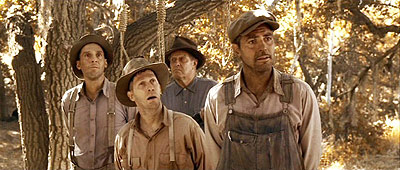
O Brother, Where Art Thou?, 2000
The Coen Brothers did it. O Brother, Where Art Thou? Sympathy for the American story. Great Plains or Skyscrapers; didn’t matter. If you had a touch for music in the 20th Century, pretensions of nonplussed rural plods struck as backwards affect. America was serious business. Real things happened there.
The soundtrack, produced by T-Bone Burnett—a sort who has been responsible for a whole lotta good “produced by” outings, and not too many originals—collected the Alan Lomax perspective with covers by those living. Gillian Welch was the one who took me at two moments. First, flight over fields in prison wear, with Alison Krauss. The Kossoy Sisters were used in the picture, but the soundtrack version stuck as definition.
“Sun bright morning
When this life is o’er
I’ll fly away
To that home on God’s celestial shore
I’ll fly away.I’ll fly away
Oh glory!
I’ll fly away in the morning.
When I die Hallelujah by and by
I’ll fly away.”
—from “I’ll Fly Away”
Second, river washer seduction. Moonshine sedative. “Didn’t Leave Nobody but the Baby.” Music prejudice washed away too. Before: country was Hillbilly music. After: gimme slide guitars and cowboy hats. Took me years before I got to learning properly. Alison Krauss hit a spot, sure.
“Jesus Help Me To Stand.” Union Station did Bluegrass good, with or without Krauss. “The Boy Who Wouldn’t Hoe Corn.” Dan Tyminski is the fellow who brought the Soggy Bottom Boys to life.
Emmylou Harris did her thing well, too. I knew her from Dylan’s Desire, long before I got around to buying her records. Elite Hotel, Pieces of the Sky. “California Cottonfields” and “Satan’s Jewel Crown.” Farm work and the Devil is where it’s at.
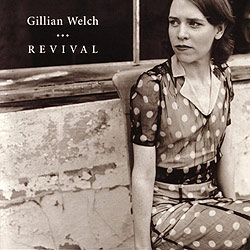
Both Krauss and Harris were appreciated, but neither hit the melancholy right. The down in the dirt, wide screen knock of the O Brother soundtrack and its film were hard to find in their recordings. I had forgotten about the search for a time, but when I saw the cover to Welch’s Revival, it hit me again. Before live performances became an education, the cover insisted Gillian Welch was who I was looking for. Old time beauty. Revival was open intent, of mine and hers. Revival of that feeling, and of a music that brought removed lucidity.
As with the fictional American history of the (mostly) Canadian (THE) BAND, there is a love for the old time aesthetic, and for the construction of an alternate past. And naturally, for the places where the traditional music of the Irish, Scottish, and English converged with a new world. Appalachia moves creation still. Like THE BAND, Welch has no affect. This is not about authenticity—though some misguided folkies may point to it as a hard-on maker—it is about working in the medium of musical terraforming.
Gillian Welch has not been terribly prolific as a solo artist. She has recorded five albums since her 1996 debut, and one with her partner David Rawlings, where she features heavily. Revival and Hell Among the Yearlings are produced by T-Bone Burnett; the rest are credited to Rawlings, but should rightly be considered a collaboration with Welch.
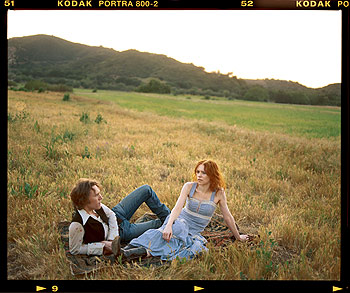
“Orphan Girl” opens the Revival. As the first word from Gillian Welch, it contains all of the elements that define her music. Isolation, outsider in a harsh world, salvation comes slowly. God is The Lord, and is an important character. He is required for righteous justice. The only alternative for the poverty stricken is the dirt.
“When I cross over
I will shout and sing
I will know my saviour
By the mark
Where the nails have been.By the mark
Where the nails have been
By the sign
Upon his precious skin
I will know my saviour
When I come to him
By the mark
Where the nails have been.”
—from “By The Mark”
This is mystic, coarse salvation. This is desperate elation. Revival rocks a little bit. “Pass You By” has more than a bit of T-Bone’s breezy country rock about it, an approach that Gillian would return to on Soul Journey. “Tear My Stillhouse Down” is apocalypse warning. Might be a small town, but you will miss me when I’m gone.
Mostly though, Revival starts as it means to go on, lowdown contemplation. A pair of guitars and some harmony, perhaps. Percussion is soft and sweet. “Paper Wings” is something that David Lynch would write a scene for. Out of time, reverbed, distorted guitar. Some of Chris Isaak’s behind closed doors perversion.
Hell Among the Yearlings is a more desolate affair.
“I looked around,
Been all up and down
I never wasted time on two or three.
There’s only one girl for me.There was a time she used to treat me fine.
But lately she’s been acting awful stoned.
Makes a man weep and moan.
My morphine be the death of me.”
—from “My Morphine”
Trapped under it. Can’t come up for air. Lost yourself. Trapped underground. “Miner’s Refrain” is the dirt and the fog. Calloused hands, a long way down. A long way down the road. Working man. Tell my family something. There are bright moments. “Winter’s Come and Gone” is nature and hardship, but up and out there. Original, but of the time it evokes, which cannot be defined on linear track.
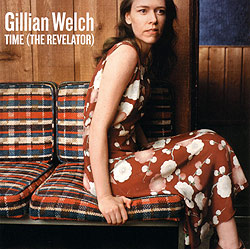
Time (The Revelator) is perhaps Gillian Welch’s best. Her third album, and the first where Dave Rawlings takes the producer’s credit. Every word seemed to date her/Time’s a revelator. The album is a meeting of evocative tales of water and love and dust, and some unusually personal, and pointed commentary for the modern world. “Everything is Free” is just about the best response to the de-valuing of art that has been produced. “Red Clay Halo” replaces “I’ll Fly Away” as the ideal vision of earth living. Heaven is the place where poor folk can embrace the dirt on their feet.
“When I pass through the pearly gates
My gown be golden still
Or just a red clay robe
With a red clay wings
And a red clay halo for my head.”
“I Dream a Highway” closes the album. At 14 minutes, and bringing to mind Bob Dylan’s dreamlike travelogue “Highlands,” it might be the best song in Welch’s career.
“Oh I dream a highway back to you love
A winding ribbon with a band of gold
A silver vision come and rest my soul
I dream a highway back to you.”
Soul Journey has a different sound, close to Revival, but brighter. More percussion, bass and fiddle. As they say, A FULLER SOUND. Keeps with the songs; “Look At Miss Ohio” and “Wayside/Back In Time” work beautifully with the band sound. “One Monkey” gets repetitive, and doesn’t go anywhere pleasing. “Wrecking Ball” really does manage to rock. Electric guitar sound, pointing to the freeing power of “Like a Rolling Stone.”
From 2004 to 2009, Gillian Welch did not release any music, citing a terrible case of writer’s block. In 2009 she did contribute to David Rawling’s debut release as a solo artist. Friend of a Friend, credited to Dave Rawlings Machine—featuring some of the Old Crow Medicine Show—is a good album that puts Welch in the supporting role. It takes a good amount of material that was at one stage considered for the next Gillian Welch album, as well as some covers. The opening “Ruby” is a sweet love song that is greatly improved in live performance, by the greater prominence of Welch’s voice.
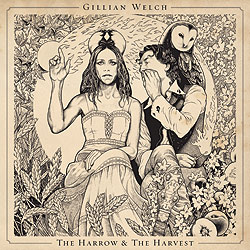
It was not until 2011 that a real, honest to goodness, new studio album from Gillian Welch appeared. The Harrow and the Harvest—the title suggesting the arduous creation process—is particularly sparse, especially in comparison with Soul Journey, and features only guitar, harmonica, and “hands & feet.” There are several songs that are as beautiful evocations of the harshest parts of America’s history as any written. It is hard to see how Welch will be able to surpass “Hard Times” as a vision of desperation and the ties that maintain the heart. When a mule is all you have, that mule is a reason to live. Music makes you human.
“Said it’s a mean old world
Heavy in need
That big machine is just picking up speed
They were supping on tears
They were supping on wine
Y’all get to heaven in our own sweet timeSo come on you Ashville Boys
Turn up your old time noise
And kick till the dust comes up
From the cracks in the floor.Singing Hard Times ain’t gonna rule my mind
Hard Times ain’t gonna rule my mind
Hard times ain’t gonna rule my mind, no more.”

“Dark Turn of Mind” is what I love in Gillian Welch, and why her music does it for me. You’ll never know how happy I be when the sun’s going down/Some girls are bright as the morning and some girls are blessed with a dark turn of mind. Dark heroine.
“The Way It Will Be” Confused love. What just happened here? Fated bother.
“I’ve never been so disabused
Never been so mad
I’ve never been served anything
That tasted so bad.
You might need a friend
Any day now, any day
Oh my brother be careful
You are drifting away.”
Gillian Welch makes music for those that drifted away a long time back. For people who are never coming back. This is out there, wilderness music. Isolated souls who need something, this is it. You’ll still be alone, and lost to the world. You’ll have your mule though. And if you keep a hold of it, you might be able to make it to the end of the road.
One Response to “Gillian Welch: Dark Turn Of Mind”
June 30th, 2012 at 12:30 pm
I would be remiss if I did not also point out her collaborations with The Decemberists!
Time limit is exhausted. Please reload the CAPTCHA.